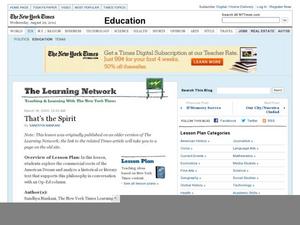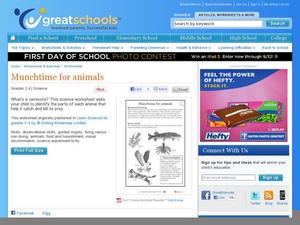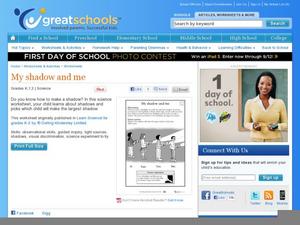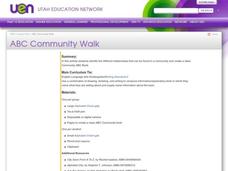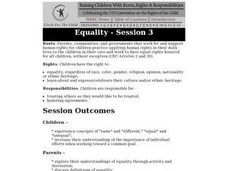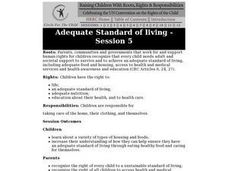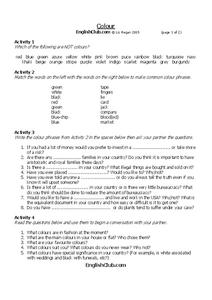Curated OER
Place Value for Decimals
Are your fourth graders having problems with decimals? Help them identify the place value of various numbers. Here, they describe what happens to the value of different numbers, as well as select numbers with given values in the tenths...
Curated OER
Around the World in 180 Days
Where did I come from? How did I come to be in this classroom? Using curriculum from Kidspiration, class members research the homelands of their ancestors, as well as the journeys that began from many parts of the world and ended with...
Curated OER
What's In a Phrase? Finding Historical Understandings in an Immigrant Guidebook
Using a Chinese-English phrase book from the late 19th century, learners view a glimpse of life on the frontier for a Chinese immigrant. They work in groups and on their own to analyze and summarize the content of various phrases, given...
Curated OER
That's the Spirit
Is, as Walt Whitman contends, America’s “almost maniacal appetite for wealth,” the heart of the American dream? Class members grapple with this question as they read David Brooks’ article “The Commercial Republic,” and quotes that...
Curated OER
Munchtime for animals
Which animals eat meat to stay alive? Third graders group fish, hawks, and cats into carnivores and herbivores. An extended activity prompts kids to cut out magazine pictures of different animals according to the foods that they eat.
Curated OER
My Shadow and Me
Practice making shadows with a kindergarten science experiment. After deciding which picture would represent the biggest shadow, kids use a flashlight to experiment with their own shadows. For extra fun, have kids mark their shadows...
Curated OER
The Important Thing
Eighth graders describe their families, and find common elements with other students in regard to their families. They read the book, The Important Book, then create another page for the book.
Curated OER
Social Studies: Families Today and Yesterday
Students examine past and contemporary family life. Using Venn diagrams, they compare and contrast the two and write short statements about them. Among the areas for consideration are clothing, food, transportation, and traditions.
Curated OER
ABC Community Walk
Students listen to several stories about cities and different types of communities. They take a walk in their city to identify unique characteristics. They create an alphabet book using people or features of their own community to go...
Curated OER
Stone Soup
Learners explain how various cultures affect the interactions that take place in a community. They compare and contrast families by where they live, the jobs they hold and the types of food they eat. Using examples, they sort goods and...
Curated OER
Family Life Cycle - Breakfast Lab
Students review the nutritional needs of various age groups. In groups, they plan a breakfast meal for different age groups and spend time making the foods. To end the lesson, they serve the food to their classmates for an evaluation.
Curated OER
Equality: Children's Rights
Students and parents participate in a variety of activities designed to help them explore the similarities and differences of people. They design and wear masks, sort attribute blocks, read stories, discuss the rights and...
Curated OER
Adequate Standard of Living: Children's Rights
Pupils and parents participate in a variety of activities designed to explore the issue of every person's right to adequate housing. They make butter, make models of different types of housing, read books, discuss the rights and...
Curated OER
Happy Birthday Whitehouse
First graders explore the White House and its history through celebrating its birthday. Basic facts are examined and personal experiences related to the exploration of this structure.
Curated OER
What is an American?
Students create a collage in groups that illustrates what it means to be an American. In this being American lesson plan, students compare different kinds of families and present their collage and describe what it means to be an American.
Curated OER
Building Bridges for Young Learners
Students compare and contrast families around the world emphasizing the country of India. In this families lesson plan, students share and learn about roles in families, how we share characteristics, and how families in India are similar...
Curated OER
Color
In this color activity, students, with a partner, explore and discuss a variety of activities associated with a large variety of colors, and how colors are significant to various countries. An interesting writing assignment is at the end...
Curated OER
Culinary Diversity
Students discover foods associated through different cultures and how they came about. In this food culture instructional activity, students investigate the different influences on the diets of different people based on their...
Curated OER
Countries, Food, and Culture
Students examine foods from other countries. In this multicultural lesson plan, students write down names of different restaurants and categorize pictures of foods according to the specific restaurant. For example, Won Ton Soup would be...
Curated OER
The Family
In this family in American society worksheet, students respond to 7 short answer questions and answer 15 vocabulary matching questions regarding the institution of family in different cultures.
Curated OER
Transforming Parabolas
In this Algebra II worksheet, 11th graders examine the affects of changing h and k in the vertex form of the parabola. The three page worksheet provides explanation of topic, worked examples, and four practice problems. ...
Curated OER
Things Are Looking Up
In this activity, students will write a description of a person in their community whom they admire.
Curated OER
Lesson Plan 1: Up, Down, Right, Left - Function Families
Students work in small groups to draw the trajectory of several scenarios. They label parts of the resulting parabola (vertex, axis of symmetry). Students complete four stations to explore quadratic functions.
Retro Play
Reverse Charades
For a fun bonding time for the class or an introduction to pantomime, this game hits the mark. An individual from a team guesses at the clue that the rest of the team is acting out–without ever talking about how they will do it, making...



